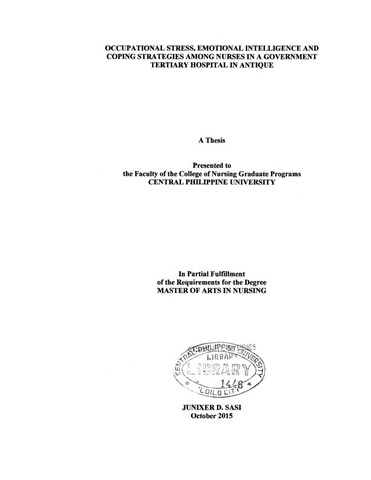Occupational stress, emotional intelligence and coping strategies among nurses in a government tertiary hospital in Antique

Page views
11,038Date
2015Author
Thesis Adviser
Defense Panel Chair
Share
Metadata
Show full item record
Abstract
This descriptive-relational study was conducted to determine the occupational stress levels, emotional intelligence levels and coping strategies of nurses in a government tertiary hospital in Antique. It also aimed to determine if occupational stress, emotional intelligence and coping strategies among nurses vary according to their personal characteristics in terms of age, sex, civil status and length of service. Furthermore, this study aimed to determine the relationship between the variables.
The respondents of the study consisted of 124 registered nurses of Angel Salazar Memorial General Hospital who were selected using stratified random sampling. A one shot survey design was employed and data were collected using Expanded Nursing Stress Scale, Emotional Intelligence Self-Evaluation, and Brief Coping Orientation of Problem Experience Inventory, all self-administered questionnaires. Mean, and frequency distribution were used to analyze descriptive data, while Gamma coefficient, Chi-square test and Cramer’s V were used to determine relationships between variables with the level of significance set at 0.05.
The findings of the study showed that most of the nurses were in their early twenties, female, single and with 5 years of service or less. More than half of the nurses exhibited moderate levels of occupational stress, though, a considerable proportion reported low levels of occupational stress. Only a few showed high levels of occupational stress. Majority of the nurses needed some development on their emotional intelligence, though, a sizable percentage manifested definite strength. Only a few needed substantial development on their emotional intelligence. Furthermore, most of the nurses generally utilized emotion-focused coping strategy, however, a sizable minority used problem focused coping and only a few practiced avoidant coping.
Age, civil status and length of service were found to be significantly related to occupational stress, while no relationship was found between sex and occupational stress. Correspondingly, age, civil status and length of service were found to be significantly related to emotional intelligence, while sex generated no significant relationship with emotional intelligence. On the other hand, personal characteristics in terms of age, sex, civil status and length of service were found to have no significant relationship with coping strategies.
Further findings revealed that there was a significant relationship between occupational stress and emotional intelligence. However, no significant relationship was found between emotional intelligence and coping strategies, and between occupational stress and coping strategies.
A substantial relationship was found between occupational stress and coping strategies when emotional intelligence showed definite strength. However, there was no significant relationship between occupational stress and coping strategies when emotional intelligence needed development.
Description
Abstract only
Suggested Citation
Sasi, J. D. (2015). Occupational stress, emotional intelligence and coping strategies among nurses in a government tertiary hospital in Antique (Unpublished Master's thesis). Central Philippine University, Jaro, Iloilo City.
Type
ThesisSubject(s)
Department
School of Graduate StudiesDegree
Master of Arts in NursingShelf Location
GSL Theses 610.73072 Sa78
Physical Description
xiii, 125 leaves
Collections
The following license files are associated with this item:


